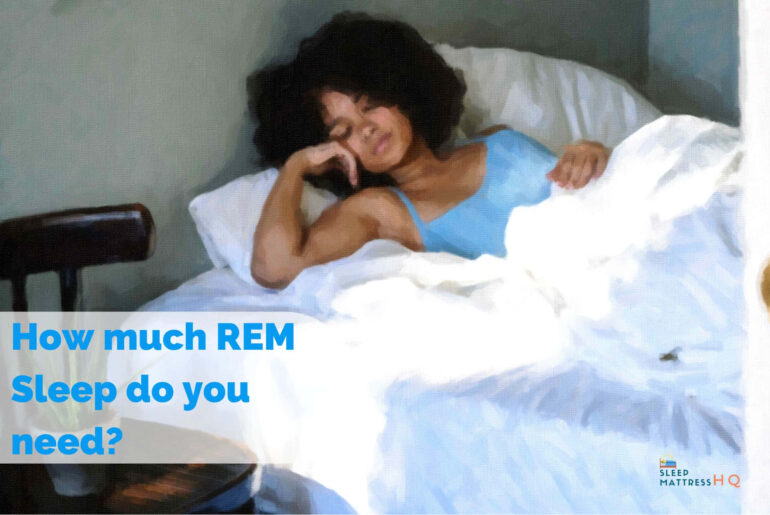It is usually considered healthy if 15-30% of total sleep time is REM sleep. However, there are a number of factors that may affect the amount of REM sleep adults require, including your age, gender, and overall health condition.
Sleep is an integral part of our internal body processes. The impact of healthy sleep is significant in overall health and well-being. It comprises two distinct phases of sleep: non-rapid eye movement (NREM) which includes light sleep as well as deep sleep and rapid eye movement (REM) involving dreams.
We spend most of our sleep in REM sleep which makes it important to understand its role and how it contributes to our sleep quality.
Let us try to understand the importance of REM sleep and how much of it we need for healthy physical and mental health.
What Is REM Sleep? And What happens during REM sleep?
Before we proceed further, let us simplify and understand what is REM sleep. Our sleep is a cyclic process with 5 stages of sleep. REM sleep is the last stage in every sleep cycle. Every night we go through 3 to 5 cycles of sleep.
Our brain is most active during this stage of sleep but our limbs become temporarily paralyzed and do not move. During this time, our breathing rate increases. It is also accompanied by a rise in heart rate, blood pressure as well as body temperature.
The first REM cycle starts roughly after 90 minutes of Non-REM sleep. It lasts for around 10 minutes but the length of the REM phase increases with each subsequent sleep cycle. And it is the longest phase during the last cycle of sleep.
This is the stage associated with vivid dreams. The process of dreaming helps in memory retention and registering your learnings.
As the name suggests, there is a rapid movement of the eyes. Many researchers associate this directly with the process of dreaming but others contradict this. The real reason for this movement is still under study.
Research has shown that this phase also boosts our creativity and problem-solving abilities.
How much REM sleep do you need?
There has been a lot of research done to understand different sleep stages, but there are no clear parameters that will fit everyone. As a general thumb rule, an average of 90 to 150 minutes of REM sleep out of 8 hours of sleep per night is considered to be healthy.
REM sleep percentage is highest in infants and it keeps dropping as you grow older. Therefore, despite the fact that older people sleep longer, their REM stage is the shortest among all age groups.
A word of caution to all those people who obsess about the amount of sleep in each stage. The overall quality of sleep is more important. So, whenever you run short of sleep on a given day, it is likely that the body will compensate to make up for it over the next few days.
Reasons for Low REM Sleep
The REM phase is considered a restorative sleep phase but chronic poor REM sleep can lead to sleep disorders.
It is essential to ensure that you are getting quality sleep on a consistent basis. During the REM phase, acetylcholine and norepinephrine are released. These neurotransmitters will undergo imbalance if there is a drastic change in REM sleep.
Let us look at factors that can contribute to the imbalance in these neurotransmitters that can affect REM sleep.
Caffeine and Alcohol
Consumption of caffeine or alcohol closer to bedtime can affect your sleep. Caffeine increases the alertness of the brain which help you stay awake disrupting all the stages of sleep.
Both alcohol and caffeine interfere with the circadian rhythm or sleep-wake cycle of the body.
Medications
Due to some health conditions, you may be on some medication that can cause problems with your sleep. Many medicines such as antidepressants or certain stimulants in medicines have sleep-related side effects.
Sleep Disorder
A condition such as sleep apnea can wreck your REM sleep due to frequent disruptions in the night. There are other similar sleep disorders that affect your sleep at night.
Age
An infant sleeps for 12-15 hours and 50% of the sleep is REM. As you grow older, the REM sleep percentage decreases, and its shortest in the elderly. So age can also be one of the factors responsible for low REM sleep.
Sleep Hygiene
The majority of people neglect sleep or have poor sleep hygiene. They don’t follow a proper sleep schedule. The usage of electronic devices, watching TV before bedtime, or having a heavy meal at night are examples of poor sleep habits that adversely affect sleep.
Lifestyle and Stress
Lifestyle changes like working late the night, unhealthy eating, and usage of drugs for recreation are costing sleep quality. Work stress or stress related to relationships can cause anxiety and create sleep issues like sleep deprivation.
Effects of Low REM sleep
In the previous section, we discussed the things that can lead to low REM sleep. Many people use fitness devices to track their sleep. Although tracking and data collection have always been a point of contention, they can provide some good initial information.
Here are a few effects of impaired REM sleep
Poor memory
As the REM stage is responsible for memory consolidation and retention, it can affect your cognitive ability to recall information. This is the reason students are advised for proper sleep the night before their exams.
Emotional Instability
Another key function of REM sleep is to help you effectively regulate your emotions. The lack of sleep can affect your mood and you may face difficulty in processing your emotions. It can also lead to anxiety or depression.
Heart-related Issues
Low REM sleep increases your chances of developing cardiovascular or heart-related diseases.
Poor Physical Health
It is also indirectly related to gaining weight and obesity.
References:
- https://greatergood.berkeley.edu/article/item/why_your_brain_needs_to_dream
- https://www.ucsf.edu/news/2022/08/423531/eye-movements-rem-sleep-mimic-gazes-dream-world
- https://www.cuimc.columbia.edu/news/new-research-suggests-rem-about-eyes-not-dreams
- https://pubmed.ncbi.nlm.nih.gov/12421655/
- https://www.ncbi.nlm.nih.gov/pmc/articles/PMC4117056/

